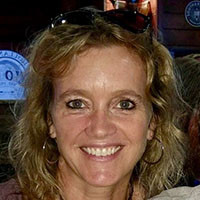The Municipal Clerk truly is a community’s jack-of-all-trades, often overseeing multiple departments and performing numerous tasks daily to keep local governments and public services running smoothly and efficiently. Conversations With Clerks is a continuing DeCoder series in which we talk with Municipal Clerks from across the country to learn more about their unique experiences and what it takes to be effective and successful in their roles.

This issue’s featured clerk
Jill Dix
Town Clerk
Holland, NY
Tell us a little about the Town of Holland.
Holland, NY is located south of Buffalo, NY. We’re a super small, very rural community with about 3,500 residents and we have a number of smaller communities around us that are essentially part of our town. We were originally the home of Fisher-Price toys years ago and our population was significantly higher back then. We really are the sleepy little town where the streets roll up at night and there’s not a lot of crazy city life that goes on here. We have some nice little shops and restaurants but nothing in the way of big industry. A lot of our residents commute to Buffalo for work.
How long have you been Town Clerk?
I’ve actually been the town clerk for seven years and I’ve been with the town for 25. I was the town bookkeeper before becoming clerk. I was the bookkeeper at the town and a clerk at our local school, which gave me a bit more flexibility to be available for my children. When the job (of full-time town clerk) popped up, my children were at a better, grown age so I decided to go for it to make life a bit simpler rather than bounce between two jobs. My grandfather was actually town clerk in Holland for 20 years, so I’ve been in this building my whole life. I was very acclimated, and I decided it was the right time, so I went for it.
In addition to Town Clerk, I see that you are also Tax Collector and Water Clerk for the town. How do you juggle all your roles?
It’s difficult at certain times of the year. There are occasions when everything is totally insane and then there are other times when things get really quiet when we can concentrate on bigger or longer-term projects. So, it really varies. In September and October, it’s budget time, it’s water bill time, and it’s tax collection time. It can be hard to juggle sometimes but we do it. We get through it.
What do you like most about your job?
I enjoy the people the most – our residents. I know almost everyone in town, and I like to try and help them when I can and advocate for them at all times. I’m fortunate because we have a very good town board and supervisor, so it makes things easy.
What are the biggest challenges you’ve seen in your job in the time you’ve been there?
I would say budgeting is difficult – trying to provide services but also trying to keep the taxes low. I would also say that change is hard in some respects. People especially in smaller towns are used to things a certain way and tend to drag their feet when it comes to change. We’re very rural and to ourselves, so when you have to do something new for residents that gets challenging, whether it be something as small as garbage pickup. I often hear the phrase “well that’s not how we’ve always done it.” So, it can be challenging to get people on board.
How has technology changed your job?
It’s changed in areas such as credit card payments for fees and permits. We also just got (the) MapLink (online zoning map), which is awesome! I love it! I’ve been pushing to get it for a long time. It really helps me most with property variances. We often have to run a legal notice and notify people who live within so many feet of a particular piece of property. (With MapLInk) I can just input the address and how many feet away the property can be, and it will give me list that I can print out and use as a mailing list — which is great. The tool also cuts down on some of my phone calls with realtors, developers and contractors and other people who want answers to zoning questions. Now they can just access that information themselves.
How important is it to have your code up to date?
It’s very important. I think you have to be proactive in knowing what changes to the code are coming — things like new legislation for cannabis, or AirBnBs for example. There are some people who are very up on the latest ordinances and who can get through the code easily to see what they can do and can’t do. So having an updated code is vital.
What advice would you give new clerks who are just starting out?
For one, learn how to take lots of good notes. There are so many things that you may just do once a year such as filing a certain form with the State. So, it’s super easy for things to get lost. I also think that just being there for your residents is probably the most important thing. I try to stay very bipartisan as well. I listen to what residents say and don’t give my opinion from a political standpoint because there is really not a place for that here. This position should never be political. So, I think really just being there for your residents and advocating for them and taking lots of notes for all of those little things that come up are good tips.
Do you mentor any new clerks?
I’m not a mentor to other Town Clerks but there are four or five of us in similar towns, similar size, all neighboring towns, and I do enjoy that we can work together. We constantly text back and forth and bounce questions off one another. I wouldn’t consider it mentoring but I definitely utilize my neighboring clerks.
How do you educate yourself to help you improve in your job?
We have our monthly Erie County Town Clerks luncheon, which usually has the latest updates from the county or the State. I also usually attend the NY association meetings in February. There are also town clerk regional meetings. I try to get to everything I can if I can get someone to cover things at the office. A lot of the State and local agencies are good at providing information. The Department of Health is good – they will send us updates that something has changed. Other agencies, not so much. So, you do have to do a lot of research on your own at times.
How has the role of clerk changed in the time you have been at Holland?
We used to have a lot of part-time people here in certain positions but in today’s world we can’t do it that way anymore. There’s no longer that stay-at-home-Mom who wants to work a few hours a week here and there. So basically, we eliminated all that. There’s also definitely more going on in this office as far as technology is concerned. As I said earlier, it can take some time to get new tech implemented here, but once it’s up and running it has helped us do many of the tasks that people used to do by paper significantly faster. Social media is another big change. We have a town Facebook page. We put very little on it such as announcements and we don’t allow commenting and such. We just post some very important announcement-type things. We don’t want it to get into a place where commenting gets out of control. Commenting also becomes public record and then we’re required to maintain it.
What is on your bucket list?
I would love to travel the world to play every golf course there is – in the sunshine!
Any final advice?
Listen to your residents. Town Clerks are kind of like a bartender – people come in with their woes and you need to be patient and understanding. Do what you can do to help them even if it is just to get them to understand why something is happening or not happening.


